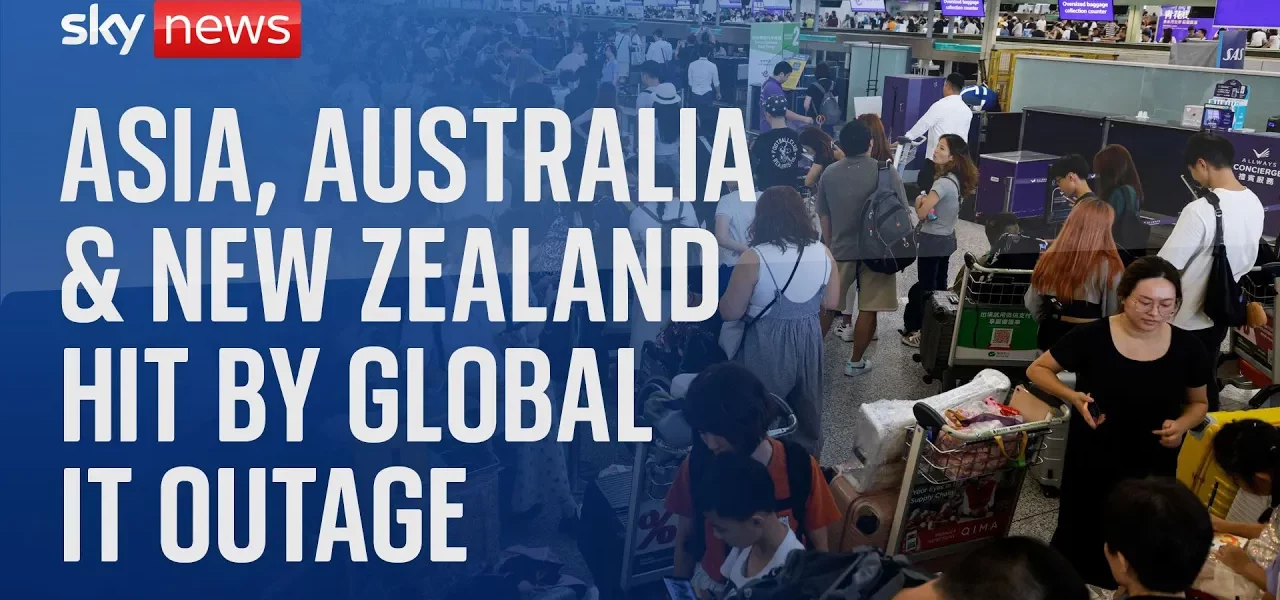Widespread Disruptions in Australia, New Zealand, and Asia Due to Cyber Incident

The recent cyber incident has triggered significant disruptions across Australia, New Zealand, and various parts of Asia. Major television broadcasters, airlines, and payment systems have been severely affected, creating chaos for travelers and businesses alike. This article delves into the details of the event and its far-reaching consequences.
Introduction
In the early hours, Australia and New Zealand were among the first to experience the fallout from a significant cyber incident. The repercussions were swift and widespread, impacting essential services and infrastructure. Major television networks in Australia went offline, and the chaos extended to airports and payment systems, highlighting the vulnerabilities of modern digital systems. This article provides a comprehensive overview of the incident, its impact on various sectors, and the response from authorities.
Impact on Broadcasting Services
The broadcasting landscape in Australia faced immediate challenges as major networks struggled to maintain operations. Here are some key points regarding the broadcasting interruptions:
- Channel 10: Experienced significant outages, affecting their ability to broadcast live news and entertainment.
- Sky News Australia: Went offline, leaving viewers without timely updates on the unfolding situation.
- ABC (Australian Broadcasting Corporation): Had to resort to emergency broadcasting measures to keep the public informed.
This incident underscores the dependence on digital infrastructure for media organizations and the potential vulnerabilities they face during cyber incidents.
Travel and Airline Disruptions
Air travel was heavily disrupted as Australian airports faced significant delays, particularly in Melbourne and Sydney. The holiday season exacerbated the situation, with many travelers looking to escape the winter chill. Key points include:
Airline Operations
- Qantas: The major Australian airline managed to operate relatively smoothly amidst the chaos.
- Virgin Australia: Reported multiple operational issues, causing frustration for passengers.
Airport Chaos
Passengers at major airports encountered long wait times and check-in delays, prompting some to miss their flights. The situation was compounded by:
- Increased passenger volume during peak travel times.
- Technical issues affecting check-in systems.
- Manual check-in processes being implemented in some areas.
Payment System Failures
The ramifications of the cyber incident extended beyond travel, affecting payment systems across various sectors. Customers faced numerous challenges, such as:
- Inability to process transactions at petrol stations and grocery stores.
- Reports of payment system outages at universities and large businesses.
- Major disruptions at the Commonwealth Bank, Australia’s largest bank, impacting online banking services.
This disruption highlighted the critical nature of digital payment systems and their interdependence on stable cyber infrastructure.
Government Response and Preparedness
In response to the crisis, the Australian government took swift action. Prime Minister Anthony Albanese addressed the nation, emphasizing the government’s awareness of the situation and the establishment of a cyber task force. Key aspects of the government response include:
Cyber Task Force
The task force is designed to coordinate responses and mitigate further risks. This proactive approach is essential given Australia’s previous experiences with similar cyber incidents.
Public Reassurance
The government has reassured the public that measures are in place to handle such emergencies effectively, aiming to restore normalcy as quickly as possible.
Regional Impact Across Asia
The effects of the cyber incident were not limited to Australia and New Zealand; regions across Asia also reported disruptions. Highlights include:
New Zealand and Singapore
- Delays at Changi Airport, one of Asia’s busiest hubs.
- Airlines, including Air Asia and Vietjet, reported operational issues.
Malaysia and Hong Kong
In Malaysia, Kuala Lumpur International Airport experienced significant delays, while Hong Kong’s airport saw chaos with manual check-in processes being implemented. Travelers were advised to arrive at least four hours before their flights.
Japan and China
Reports from Japan’s Narita Airport indicated delays and cancellations, particularly affecting Jetstar flights. Meanwhile, in China, while airport operations remained stable, hotels in major cities like Shanghai and Beijing faced reservation issues, indicating a ripple effect from the cyber incident.
Conclusion
The recent cyber incident has demonstrated the fragility of our interconnected systems, affecting broadcasting, airlines, and payment methods across Australia, New Zealand, and Asia. As authorities mobilize to address the challenges, it serves as a reminder of the importance of cybersecurity measures. To stay updated on this developing story and related topics, consider following our website for further insights and analysis.
“`




